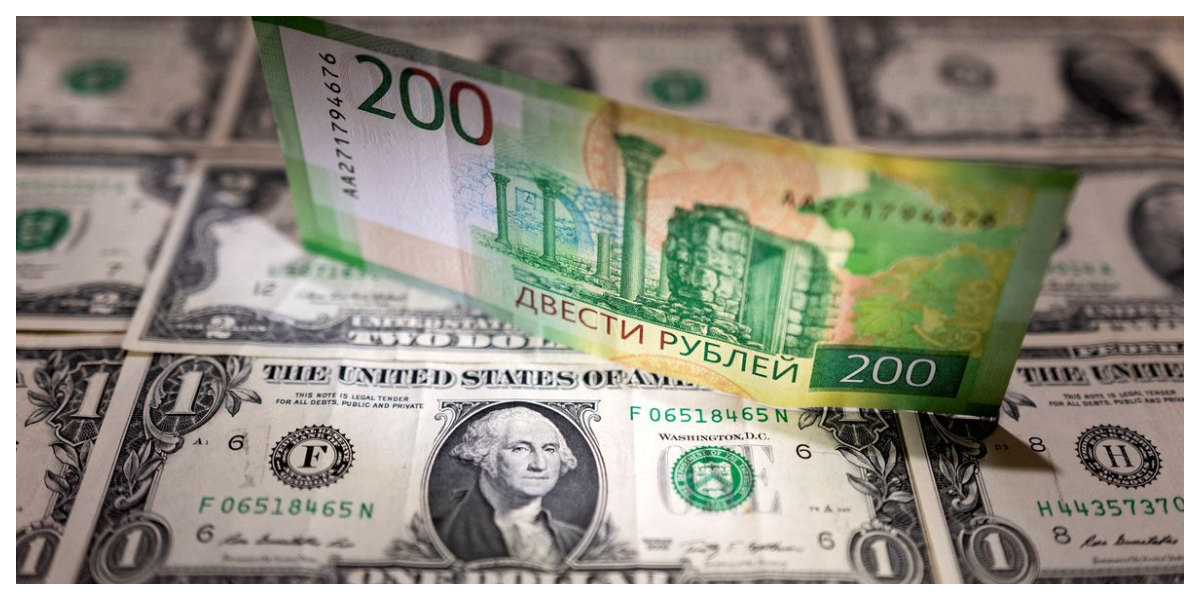USA banks have left Russia, yet that doesn’t convey that they’re done making money off the Kremlin’s horrific conquering of Ukraine.
The pay-off of Russian dues associated with Russian President Vladimir Putin’s campaign on Ukraine and the sanctions that result has generated a window for a new type of arbitrage that some in the finance world are devouring up, glimpsing it as easy money.
The plan is what’s known as an offset basis bargaining, or purchasing budget Russian government or corporate bonds along with credit default switch, which acts as insurance on the potential default of a mendicant.
Normally this type of bargaining does not make sense, but as financial institutions seem to quickly rid their portfolios of anything Russia-related, bond rates fell quicker than the rates to hedge them rose.
Information from the website Market Axes shows that Russian sovereign debt traded at a volume of $7 billion in the middle between February 24 and April 7, up from $5 billion in the same interval in 2021 — a 35% uptick.
The volume of trading in Russian corporate debt has increased to a 2 year high since Russia was seized, according to Bloomberg News.
Russian relationships are trading furiously, said Philip M. Nichols, an expert on Russia and social responsibility in business and a lecturer at the University of Pennsylvania’s Wharton School. “There’s a lot of speculators that are buying up these bonds that have been severely downgraded and are on the verge of becoming junk,” he said.
Nichols replies he’s getting constant calls from analysts interested in whether the potential trade makes sense. “The spread on Russian sovereign debt is astonishing right now,” he said. “They’re making an unusual amount of money with respect to the volume.”
The cost to ensure Russian debt rise to 4,300 basis points on April 5, up from 2,800 the recent day.
At the same time, bond rates fell awfully — with bonds maturing in 2028 trading at just $0.34 on the dollar. That way it could cost just over $4 million to ensure $10 million of Russian securities, The Economist reported.
Hedge funds like Aurelius Capital Management, Golden Tree Asset Management, and Silver Point Capital have raised their submission to Russian markets, mostly by purchasing corporate bonds, the Financial Times reported in late March.
US financial institutions like JPMorgan Chase and Goldman Sachs are clearing the way for these trades, connecting clients who need to be out of their positions with hedge funds that have an extreme risk of tolerance and less of a moral plight about purchasing Russian debt.
“This is Wall Street,” said Kathy Jones, chief settle income strategist at the Schwab Center for Financial Research. “It doesn’t surprise me that they saw some sort of a loophole they could exploit to make money.”
JPMorgan officers say that they are acting as middlemen, simply looking to aid clients. “As a market-maker, we have been helping clients reduce their risks and manage their exposures to Russia in the secondary markets. None of the trades violate sanctions or benefit Russia,” said a representative.
If clients needed to quickly unload their display to Russia they could look to Russian commanders who would happily buy back sovereign bonds, said Robert Tipp, chief investment strategist and head of Global Bonds at PGIM settle Income. Selling Russian debt to US hedge funds keeps any resulted interest out of Russian hands.
The trades are valid and lucrative, said Nichols, but highly speculative and subject to large swings based on news of Russia’s conquer of Ukraine and further punishment.
It also creates an alarming disconnect between Wall Street and the actual state of the international economy: Typically, investors would base their quotation of Russian debt on whether or not it will be refunded, and the risk that it would be refunded would depend on the strength of the Russian economy.
But that’s not going to happen. New punishment by the US Treasury on Tuesday, which stopped Russian access to any dollars they held in American banks, significantly raised the chances that Russia would revert to its debt and that its gross domestic product, the main assessment of a country’s economic power, would fall down.
The US Congress suggested this week to remove Russia’s most advocated nation’s trade status, a major economic degrade that would cover the way for deeper punishment and import controls on outcomes essential to Russia, like chemicals and steel.
The withdrawal of that status, said Nichols, would sever Russia’s integration into the global economy. If Wall Street were associated with the real world, he added, it wouldn’t want to be anywhere near Russian debt.
“Russian debt is the province of high-risk takers,” said Nichols, “and institutions should probably stay away.”

















